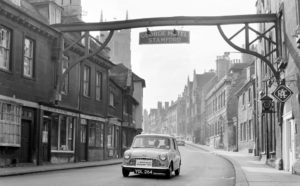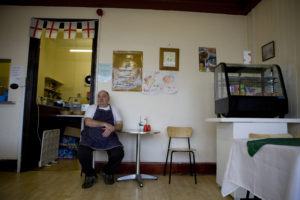On the sultry evening of 28 July, at around 6.20pm, two young girls were playing with a hula hoop and a toy pram in the centre of Boston, Lincolnshire. A woman in an upstairs flat smiled to see the nine-year-old Lilia Valutyte running around outside, shrieking with laughter as she played hide and seek with her younger sibling. Then somehow, from somewhere, in a few superheated seconds, there came the flash of a knife, and little Lilia lay dying in the street, bleeding to death on Fountain Lane.
This terrible crime electrified Lincolnshire, and gave rise to horrified headlines across the country. Floral tributes festooned Fountain Lane, and locals filed into St Botolph’s church below its magnificent early 16th century landmark tower to light candles and cry. While parishioners uttered heartfelt, inadequate platitudes, shopkeepers closed for the day, passers-by shook their heads, and a local man started a fundraiser for the family which has already attracted nearly £6,000. As a Lincolnshire Police Chief Superintendent said, people in Boston were “struggling to comprehend the incomprehensible”.
This is an awful new low in the town’s criminal annals, but it is not the first time, nor even the second, that Bostonians have struggled with the incomprehensible.
In December 2020, the body of 12-year-old Roberts Buncis was found in the woodland of nearby Fishtoft, a village previously noted only for being the attempted departure point of future Pilgrim Fathers. Roberts had suffered more than 70 knife wounds, in an attack so frenzied that the tip of a knife was embedded in his skull. An attempt had been made to remove his head and hand. His killer, Marcel Grzeszcz, then 14, had enticed Roberts to the wood under the pretext of giving him drugs to sell. It was, said another investigator, “one of the worst and saddest cases” his force had ever handled.
Four years earlier, in 2016, Boston had been called “murder capital of England” by the national press, reflecting statistics on murder, attempted murder and conspiracy to murder that outdid London or Manchester — there were 10 such cases, in a borough with a population of around 65,000, the equivalent to 15 per 100,000 people. Knife crime, imaginatively linked with inner cities, has become inexorably associated with an intimate red-brick fishing port in one of England’s least assuming areas.
Lilia’s killing resulted in a swift arrest — of Lithuanian national Deividas Skebas, 22, who has now been charged with her murder. He is a fruit picker, despite being from what a former girlfriend described as an “upper-class” background.
Not the backwater it is often assumed to be, Boston has experience of Europe. Between 1279 and 1289, it was the biggest port in England, exporting three million sheep fleeces annually, and accounting for nearly half of all the nation’s customs revenue. The town had strong links to the Rhineland — the three crowns of Boston’s crest may be an allusion to Cologne, traditional burial place of the Three Wise Men — and older brick houses have Flemish detailing. The town’s history with Eastern Europe is however more combative. The future Henry IV led a crusade out of Boston in 1390 against the stubbornly pagan “Livonians” — the ancestors of Lithuanians — with Lincolnshire archers instrumental in the capture of Vilnius. But thereafter Boston fell largely out of exciting history. During the Civil Wars, Boston was so reliably parliamentarian it was never in the front line, and its Puritan sects could, in peace, enjoy their perennial pastime of accusing each other of backsliding.
Today, though the town is unwillingly drawn into equally ugly culture wars. Violent crime has increased markedly since 2004, coinciding with the arrival of disproportionately large numbers of Polish and Baltic field-workers who descended on Boston after their countries joined the EU in 2004 (and Romanians, after 2007). The rapid changes felt deeply disconcerting to many in Boston, a town with already poor healthcare and housing, and low educational attainment and wages. The population increased by nearly 16% between 2001 and 2011, creating an EU-born minority of around 13%. Vigorous workers, often with young children, piled into the tiny, tight-knit town with cash to spend after back-breaking days picking cabbages. A godsend to agriculturists, and responsible for rejuvenating ageing districts, they were also blamed for depressing wages, over-filling houses, burdening medical practices and schools, leading parallel lives in different languages, and filling late-night streets with alcohol-fuelled altercations. Sometimes old country feuds were imported, sometimes new ones invented, as criminals of different nationalities expanded across these fertile new territories.
Most arrivals were inoffensive, even beneficial — like unlucky Lilia’s family (her mother runs an embroidery and screen-printing shop). But a few got out of hand, and their escapades sensationalised. As misunderstandings and ultimately serious crimes mounted up, there started to grow a deep, if often surreptitiously-expressed, sentiment in Boston — an inchoate feeling of being ignored, or even despised by Labour, by “London”, by all elites, including Brussels. There were also powerful economic factors at play. Farmers who relied on European labour also disliked the EU’s Common Agricultural Policy, and the trawlermen who creep with the tide down the Witham to the Wash bitterly resented fishing quotas. All too soon, as a Borough Council officer acknowledged last year, there was “significant negativity between our residents”. In one especially intemperate 2016 TV debate, a woman incensed by political reluctance to discuss immigration even claimed “all we get is murders”.
Local politics, somnolent for centuries, sparked into life. In 2007, the Borough Council was taken in a landslide by a group called the Boston Bypass Independents, campaigning mostly on transport but channelling all kinds of discontents. In 2008, a BNP councillor was elected, and in 2009 Labour lost its three remaining seats. Ukip waxed strongly in the town, with crammed public meetings; in 2012, it held its spring conference in Skegness, just up the road. In 2016, Boston delivered a 75% pro-Brexit vote, earning it opprobrium as ”Britain’s most Eurosceptic town”.
That vote may have been cathartic for the 75%, but for the 100% the consequences are unclear. The exodus of Europeans has caused short-term “critical” labour shortages, in farms and haulage firms, care homes and caravan parks, with crops sometimes left to rot and lorry-loads of goods left undelivered. Eastern Europeans are being replaced by workers from even further east and south, which may result in even less tractable problems. The United Lincolnshire Hospitals Trust has already been found guilty of racism, and the county as a whole accused by one ex-resident of “intolerance of colour”, and called “the most racist county in the country”. Historic England has also started singling out Lincolnshire locations for links to slavery, one of many pressures “woking” up the long-bypassed town to the news that it too is in history’s firing line.
But in this proud county, angst-filled preaching may merely exacerbate existing resentments towards out-of-touch elites, and London liberal opinion. And in any case, such abstract thinking seems coldly otiose, in this torrid season, with its terribly real and now timeless symbol of a little girl playing hide and seek, in streets where the future of Britain is being forged.
Disclaimer
Some of the posts we share are controversial and we do not necessarily agree with them in the whole extend. Sometimes we agree with the content or part of it but we do not agree with the narration or language. Nevertheless we find them somehow interesting, valuable and/or informative or we share them, because we strongly believe in freedom of speech, free press and journalism. We strongly encourage you to have a critical approach to all the content, do your own research and analysis to build your own opinion.
We would be glad to have your feedback.
Source: UnHerd Read the original article here: https://unherd.com/



